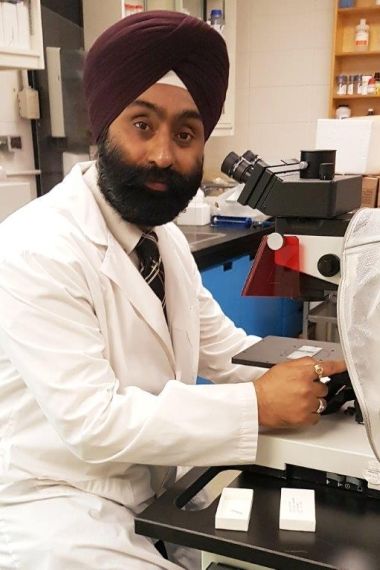
Jagdeep Walia
Clinician-scientist, KGHRI
Assistant Professor, and Head of Medical Genetics Division, Department of Pediatrics, and Department of Biomedical and Molecular Sciences, Queen’s University
- Novel gene therapy approaches for inherited and acquired neurodegenerative disorders (Tay-Sachs, Sandhoff diseases and AB variant)
- Genetic, epigenetic and metabolic changes in autism
Dr. Jagdeep Walia:
Dr. Walia received his MBSS in medicine at Guru Nanak Dev University School of Medicine, Amritsar, India. Following postdoctoral research in genetics at University of Toronto, he completed residency in Medical Genetics at University of Manitoba. He joined Queen’s University as an Assistant Professor, Medical Genetics, Department of Pediatrics in 2012, and was promoted to Head of Medical Genetics in 2015. His research lab focuses on development of gene therapy for different genetic disorders especially for neurodegenerative conditions. In addition to his clinical work and research program, he is extremely active in knowledge translation and education, aimed at increasing knowledge among clinicians and medical students, and enhancing practice of clinical genetics. He has also organized Genetics Patient and Family Day events, providing learning and support opportunities for individuals and families with genetic conditions. He is an active member of the Ontario Genetics Secretariat Committee, focused on developing a provincial strategy for genetics services and practice in Ontario. To date, his work in gene therapy has one U.S. patent pending.
FRCPC, University of Manitoba
MBBS, Medicine, Guru Nanak Dev University School of Medicine
Dr. Walia’s clinical research focuses on gene therapy for neurodegenerative diseases, specifically GM2 gangliosidosis group comprising Tay Sachs, Sandhoff and GM2A deficiency. A second research interest involves study of genetics, epigenetics, metagenomics, and metabolomics of autism. He collaborates on many studies for inherited metabolic disorders in children and adults. His early research into these incurable neurodegenerative conditions has shown promising results, and he is in the process of translating his results from a mouse model to clinical testing.
